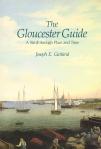 |
| PREFACE |
|
Now, a quarter-century on, as we observe the passage of 375 years since Gloucester's settlement in 1623 by a ragtag crew of fishermen from Dorchester, England, we face the onrushing pace of the millenial urgency that grips the globe. But I decline to be stampeded. Strolls and rambles are in shorter supply and more demand than ever. For all our vaunted insularity, much has befallen America's oldest fishing port in the mere fortieth of a millennium, that's raced by since I took up guiding by the book, and change has overtaken us. Still, I hold to my original caution that "this is not really a guide to Gloucester at all. No one is guided through our myriad city, only beguiled by it. Gloucester is here, and if you would savor her, you will do so on her terms, not via the megaphone of any tour director." Now we have tour directors by land and sea, and while the heart and soul of our business is still in great waters and always will be, the watching of great whales rivals the catching of small fish, because the industry that put Gloucester on the map of the world has been jeopardized the world over by overharvesting, land-based pollution and man-made global warming. And all those underplayed, down-to-bedrock, down-to-the-sea qualities that in their ingenuous absence of self-consciousness have charmed generations of visitors are ironically in peril of being overdiscovered, overexploited and overridden. Our future is driven by our past, and nowhere around these parts does this seem more the case than in our inward-looking enclave, buffeted and washed from land and sea by forces more than ever beyond our control. Conceived an ocean away when North America was all wilderness, and driven for nigh four centuries by our obsessive pursuit of what Captain John Smith called (if he only knew the half of it) a treasure greater than gold, old Glosta hangs in there against rising odds. We have become one of those rare metaphors for the ever more desperate search for individual, social and cultural identity and, yes, moral identity on a planet in the throes of inevitable global homogenization. Be not beguiled, then, by The Gloucester Guide as a chatty exercise in Yankee nostalgia. Nowhere is past more prologue than here, for all our foibles, and we need all the understanding and support we can get, from within and withqut our battered insularity, in building upon the relevance of that familiar truth. And thanks again to Laura Fillmore and Dave McAveeney and your crews for reviving the Guide once again. J.E.G. |
   |
The Gloucester Guide, Copyright © 1990 by Protean Press and Joseph E. Garland. |
 As such excursions should, The Gloucester Guide embarked twenty-five years ago upon a "Retrospective Ramble" in casual celebration of our old fishing town's 350th birthday. Seventeen years later it was revived, slyly enlarged with tidbits that had been edited from the original out of space considerations, recloaked in a mysteriously haunting painting of our harbor by our own
As such excursions should, The Gloucester Guide embarked twenty-five years ago upon a "Retrospective Ramble" in casual celebration of our old fishing town's 350th birthday. Seventeen years later it was revived, slyly enlarged with tidbits that had been edited from the original out of space considerations, recloaked in a mysteriously haunting painting of our harbor by our own